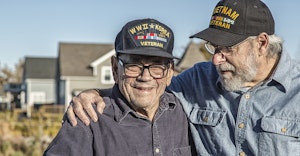Fort Campbell and Louisville, Kentucky (June 7, 2021) – Our nation’s leaders have an unprecedented opportunity to help veterans and military spouses in their states, counties and cities, but only if they act now.
The Coronavirus State and Local Recovery Funds recently allocated $350 billion across states, territories and tribal governments to be used for COVID-related economic recovery activities. Before delving into exactly how these funds can be used, it is important to understand just how much is available in each area, allowing it to be compounded to create truly impactful investment.
For instance, Anniston, Alabama was awarded $13,291,868. The town of about 21,000 sits in Calhoun County, which received another $22,066,439, and on top of that, the state of Alabama was awarded $2,120,279,417 (that’s billions). There is more funding across 20 other cities and nearly 70 additional counties in Alabama.

Veterans
That is a lot of money that can be leveraged at all levels in just one state. It is the same story in Indiana, Tennessee, Wyoming, and every state in the U.S. If our leaders are strategic in how they work together, they can use those funds to create lasting and positive impact.
USA Cares and Connected Nation are asking our leaders to consider using a portion of these funds for a critical need: providing immediate relief and long-term support for our veterans and military spouses.
The $350 billion was set aside as part of the 2021 American Rescue Plan Act. According to a fact sheet provided by the U.S. Treasury Department, this money can be used to respond to the “COVID-19 emergency and bring back jobs.”
Even before the pandemic, USA Cares worked daily with veterans who were struggling with financial needs and other challenges that made it difficult to adapt to life outside the military.
These services are focused on improving the quality of life for veterans and reducing the potential factors that can contribute to veteran suicide. Many of the needs USA Cares helps veterans meet are urgent and immediate, such as rent or utility assistance.
At the same time, Connected Nation, through its Digital Works program, is setting up veterans and military spouses for long-term success. The program provides digital career training and job placement assistance with an employer network of more than 70 national companies.
Many veterans are uniquely suited for remote work because they are self-disciplined and detail-oriented from their military training. At the same time, military spouses have traditionally had some of the highest unemployment numbers in the country. That is because employers are reticent to hire them because their loved one may be deployed to a new location without much warning and, if they work, there is often a lag time between a move and finding a new job. Not only can remote work help solve those long-term issues for veterans and military spouses, but it is also pandemic-proof.
The important takeaway for our nation’s leaders is that helping veterans and our military families requires a two-fold approach. We must first address their immediate and urgent needs, and then, we must set them up for long-term success.
There is enough money provided in the Coronavirus State and Local Recovery Funds to address both of those needs while still tackling other issues such as expanding broadband access to more people, another priority of Connected Nation.
According to the Treasury Department, the funds can be used for “serving the hardest-hit communities and families.” This includes those urgent and immediate needs we mentioned such as food, housing and other financial insecurities. We believe USA Cares can help provide a pipeline to veterans who are facing the greatest challenges.
The Treasury Department also highlights the need for “addressing the negative economic impacts caused by the public health emergency.” We believe this should include a workforce development effort—such as Digital Works—that focuses career readiness on remote work skills and opportunities. This should include an emphasis on veterans and military spouses by working together with organizations like USA Cares.
Do not let this opportunity to create long-term, positive impact in the lives of those who have served and the families who support them pass us by. We implore our leaders to act now!
You can find more details, including how to apply for the funds, by heading to this link.
About the authors:
Trace Chesser is the President and CEO of USA Cares. He is also an Army combat veteran. USA Cares is based in Louisville, Kentucky. Website: usacares.org
Tom Ferree is the CEO & Chairman of Connected Nation. The nonprofit’s Digital Works program marked its 1,000th job placement when Courtney Anaeki, an army veteran, secured a remote position on July 27, 2020 through the Fort Campbell location for Digital Works. Websites: connectednation.org and digitalworksjobs.org.